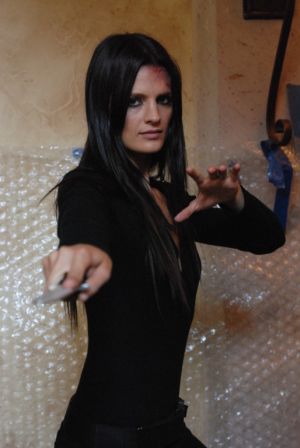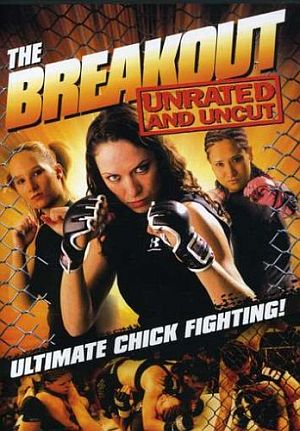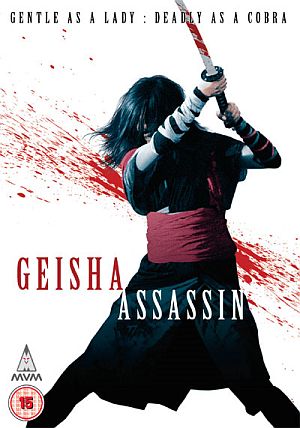★★
” Like a low-budget Andy Sidaris film. If he was Mexican and couldn’t talk his actresses into undressing.”
 I vibrated between 2 and 2 1/2 stars for this, but opted for caution: it’s probably not as bad as it seems, despite an obvious lack of budget and ambition far in reach of its abilities. Or, at least, I maybe liked it a little more. As the alternate title suggests, it’s the third in a series, though information on the first two is scant: there’s no IMDB entry for them, and they appear to have different cast members. The central character is Maria Navajas (Ponce), an abused woman who turned to killing, discovered a talent for it, and took it up as a career. This entry finds her being sought by two different groups of gangsters who believe she ripped them off, as well as the feds. She has to fend them all off, with the aid of a friendly undercover cop (Sevilla) and her agent (played by, according to the IMDB, one of the producers of Napoleon Dynamite!).
I vibrated between 2 and 2 1/2 stars for this, but opted for caution: it’s probably not as bad as it seems, despite an obvious lack of budget and ambition far in reach of its abilities. Or, at least, I maybe liked it a little more. As the alternate title suggests, it’s the third in a series, though information on the first two is scant: there’s no IMDB entry for them, and they appear to have different cast members. The central character is Maria Navajas (Ponce), an abused woman who turned to killing, discovered a talent for it, and took it up as a career. This entry finds her being sought by two different groups of gangsters who believe she ripped them off, as well as the feds. She has to fend them all off, with the aid of a friendly undercover cop (Sevilla) and her agent (played by, according to the IMDB, one of the producers of Napoleon Dynamite!).
There are elements of this that are quite laudable, with a host of strong female characters – not just Navajas, but her main adversary, the mob boss knows as “La Culata” (Cepinska), who has a fondness for female enforcers. Both the roles, and the performances behind them, are interesting enough to hold your attention, and some of the supporting pieces are also decently constructed. However, for every step forward, there’s at least one, and often two back. The storyline is over-stuffed, and at 113 minutes, this would benefit from a lot of editing. The action is largely poorly-shot, probably to conceal the limited combat talents, and with bizarre mis-steps such as one awful moment where the heroine throws her knife down the barrel of an enemy’s gun. Look, if you’re that good with the weapon, just embed it in their eye, alright? There are several moments where it looks like this is going to kick off, but doesn’t – most notably, we never get the expected confrontation between La Culata and Maria, which is a shame. Instead, the finale is the biggest let-down since the Hindenburg.
Certainly, don’t be fooled by cover art which appears to have strayed in from Single White Female, or something similar. This is a zero-budget action movie, but coming from a culture which doesn’t exactly regard women as equals, deserves some credit for putting them front and centre. However, the execution in this case leaves just too much to be desired.
Dir: Jorge Ramirez Rivers
Star: Cecilia Ponce, Anna Cepinska, Guillermo Iván, Manuel Sevilla
a.k.a. Maria Navajas 3





 Rika (Kudo) and her schoolgirl pal ditch education for a day and head off to a remote village to check up on her grandfather, who hasn’t been heard from for a while. But as soon as they arrive, the pair come under attack by zombies, initially spawned as the result of a euthanasia drug being tried out by the Japanese government to address the whole “inverse pyramid” thing. They do reach Grandpa’s house, but find him in the stages of advanced Alzheimer’s – at least, until Rika is bitten. Gramps removes the limb, and replaces it with one conveniently lying around, which happens to belong to a master zombie hunter. Who cares if it’s the wrong colour and incredibly muscular? With America preparing a Return of the Living Dead style cleansing operation on the area, Rika and her allies have to locate the King Zombie and kill him, before being reduced to their constituent atoms.
Rika (Kudo) and her schoolgirl pal ditch education for a day and head off to a remote village to check up on her grandfather, who hasn’t been heard from for a while. But as soon as they arrive, the pair come under attack by zombies, initially spawned as the result of a euthanasia drug being tried out by the Japanese government to address the whole “inverse pyramid” thing. They do reach Grandpa’s house, but find him in the stages of advanced Alzheimer’s – at least, until Rika is bitten. Gramps removes the limb, and replaces it with one conveniently lying around, which happens to belong to a master zombie hunter. Who cares if it’s the wrong colour and incredibly muscular? With America preparing a Return of the Living Dead style cleansing operation on the area, Rika and her allies have to locate the King Zombie and kill him, before being reduced to their constituent atoms. When Chino (Rodil) beats up his woman, Lucia (Sparagna) decides it has happened for the last time, and accompanied by her two friends, Celia (Mortel) and Miriam (Cho), she gives him a dose of his own medicine, with a baseball bat. This turns out to be a clear case of thinking without acting, because it turns out he’s a big kahuna in one of the local gangs, and is now out for revenge on the trio. After a drive-by cripples their vehicle (a ghettomobile with the amusing personalized plate, ‘ICUHATN’), they are stuck deep in enemy territory, with a lot of unfriendly people looking for them. And even if they make it out alive, what then?
When Chino (Rodil) beats up his woman, Lucia (Sparagna) decides it has happened for the last time, and accompanied by her two friends, Celia (Mortel) and Miriam (Cho), she gives him a dose of his own medicine, with a baseball bat. This turns out to be a clear case of thinking without acting, because it turns out he’s a big kahuna in one of the local gangs, and is now out for revenge on the trio. After a drive-by cripples their vehicle (a ghettomobile with the amusing personalized plate, ‘ICUHATN’), they are stuck deep in enemy territory, with a lot of unfriendly people looking for them. And even if they make it out alive, what then? Two gangsters are having a discussion in a sauna, when they are brutally attacked by Raina (Katic), the former girlfriend of one. The Mexican is almost decapitated; the other, Greek mob boss Virgil Vadalos (Berenger) is gutted, but survives. He vows to track down his ex-squeeze and unleashes his forces to do so. They include the near-psychotic Lee (Biehn), who has just returend from London with an even more insane sidekick, plus dirty cop Beck (Sloan), who owes Vadalos a favour, and is involved in the investigation from the inside. Keeping those aspects separate becomes more difficult, as the waters become increasingly muddied as more bodies show up, murdered with the titular weapon, the Mexican’s colleagues plot their own revenge, and there’s also the tricky matter of several million dollars in cash which has gone missing.
Two gangsters are having a discussion in a sauna, when they are brutally attacked by Raina (Katic), the former girlfriend of one. The Mexican is almost decapitated; the other, Greek mob boss Virgil Vadalos (Berenger) is gutted, but survives. He vows to track down his ex-squeeze and unleashes his forces to do so. They include the near-psychotic Lee (Biehn), who has just returend from London with an even more insane sidekick, plus dirty cop Beck (Sloan), who owes Vadalos a favour, and is involved in the investigation from the inside. Keeping those aspects separate becomes more difficult, as the waters become increasingly muddied as more bodies show up, murdered with the titular weapon, the Mexican’s colleagues plot their own revenge, and there’s also the tricky matter of several million dollars in cash which has gone missing. In the near-future, Japan is plagued by “engineers” – criminals who have voluntarily undergone genetic modifications, which not only mutate their bodies in bizarre ways, but give them near superpowers and the ability to sprout weapons from their wounds. To combat this, the privatized Japanese police force under their chief (Benny) has an absolutely no-holds barred policy of shoot first, ask questions… Well, don’t bother asking questions. Their top “engineer hunter” is Ruka (Shiina, whom you may recognize from Audition), the daughter of a police officer who was killed in the line of duty while she was just a young girl. She is tracking down the scientist behind the engineers, known as “Key Man” (Itao) because of the key-shaped tumours which trigger the mutations. But when they meet, he infects her – and also reveals the truth behind the deaths of both their fathers.
In the near-future, Japan is plagued by “engineers” – criminals who have voluntarily undergone genetic modifications, which not only mutate their bodies in bizarre ways, but give them near superpowers and the ability to sprout weapons from their wounds. To combat this, the privatized Japanese police force under their chief (Benny) has an absolutely no-holds barred policy of shoot first, ask questions… Well, don’t bother asking questions. Their top “engineer hunter” is Ruka (Shiina, whom you may recognize from Audition), the daughter of a police officer who was killed in the line of duty while she was just a young girl. She is tracking down the scientist behind the engineers, known as “Key Man” (Itao) because of the key-shaped tumours which trigger the mutations. But when they meet, he infects her – and also reveals the truth behind the deaths of both their fathers. I have no problem with rape/revenge movies, providing the balance is skewed more towards the revenge than the rape. Ms. 45, for example, has about five minutes of rape and 60 of revenge. This is fine by me. I am all about the revenge, which should be nasty and brutal, exactly what sexual predators deserve. Actually, so should the rape be, because portraying it any other way is very, very questionable. But that’s something which hardly needs depicting: I’m quite happy taking it as read, thank you very much. Here, the depicted brutalization of four young women goes on far longer than necessary to serve any
I have no problem with rape/revenge movies, providing the balance is skewed more towards the revenge than the rape. Ms. 45, for example, has about five minutes of rape and 60 of revenge. This is fine by me. I am all about the revenge, which should be nasty and brutal, exactly what sexual predators deserve. Actually, so should the rape be, because portraying it any other way is very, very questionable. But that’s something which hardly needs depicting: I’m quite happy taking it as read, thank you very much. Here, the depicted brutalization of four young women goes on far longer than necessary to serve any  S’funny what you stumble across on Netflix, at the end of a long chain of “See also…” recommendations came this, which according to the
S’funny what you stumble across on Netflix, at the end of a long chain of “See also…” recommendations came this, which according to the  The shortest match of the night – lasting exactly one minute – was a bit unfortunate, as Shayna Baszler actually broke the arm of her opponent, Samantha Anderson. She was applying a submission hold on the arm, but it seemed that Baszler fell forward, resulting in the pressure being made much worse, and resulting in a clean break of her humerus. Ouch. The opening contest [on the DVD – there was an amateur fight not included for some reason] was the only one that lasted longer than one five minute round, with Marissa Inhofer beating Kirsty Bushnell. As well as being the brother of another MMA figher [Nick Inhofer was on The Ultimate Fighter 3] Inhofer was a roller-derby girl, and seemed to have brought a large contingent of her team-mates with her.
The shortest match of the night – lasting exactly one minute – was a bit unfortunate, as Shayna Baszler actually broke the arm of her opponent, Samantha Anderson. She was applying a submission hold on the arm, but it seemed that Baszler fell forward, resulting in the pressure being made much worse, and resulting in a clean break of her humerus. Ouch. The opening contest [on the DVD – there was an amateur fight not included for some reason] was the only one that lasted longer than one five minute round, with Marissa Inhofer beating Kirsty Bushnell. As well as being the brother of another MMA figher [Nick Inhofer was on The Ultimate Fighter 3] Inhofer was a roller-derby girl, and seemed to have brought a large contingent of her team-mates with her. Taking a minimalist approach to its plot, particularly for the first hour, it’s about Kotomi (Tsukui), who is on a quest to find the man (Kanai) who was responsible for killing her father (Nomura), a samurai who wanted to leave his sklls to her. To reach the killer, she has to battle her way through a series of lower-level minions, such as a pack of ninjas, a monk and Pocahontas [ok, that might be a stretch, but honestly, that was my first thought on seeing her]. However, after she has fought her way past these henchmen and henchwomen, to reach the boss
Taking a minimalist approach to its plot, particularly for the first hour, it’s about Kotomi (Tsukui), who is on a quest to find the man (Kanai) who was responsible for killing her father (Nomura), a samurai who wanted to leave his sklls to her. To reach the killer, she has to battle her way through a series of lower-level minions, such as a pack of ninjas, a monk and Pocahontas [ok, that might be a stretch, but honestly, that was my first thought on seeing her]. However, after she has fought her way past these henchmen and henchwomen, to reach the boss 

 This unofficial spin-off from the Zatoichi series had us wondering if there’s a Japanese studio version of The Asylum out there – the people who specialize in knockoffs of popular films, including such classics as Snakes on a Train and Sunday School Musical. We’ll cut the makers of this some slack, since we’re of the opinion that all action films are improved with a heroine in the lead. That’s the main switch here: Zatoichi becomes Ichi (Ayase), a blind swordswoman and entertainer, who is roaming the country in search of the man she believes is her father. She is quite capable of taking care of herself, but the resulting trail of bodies is blamed on travelling companion Tomo Fujihira (Ôsawa), who becomes bodyguard to a town under assault from a gang, led by Banki (Nakamura). Unfortunately, since he accidentally blinded his mother, Tomo is unable to pull his sword from its scabbard, and the Banki gang are ready to wreak revenge on him for the members killed by Ichi.
This unofficial spin-off from the Zatoichi series had us wondering if there’s a Japanese studio version of The Asylum out there – the people who specialize in knockoffs of popular films, including such classics as Snakes on a Train and Sunday School Musical. We’ll cut the makers of this some slack, since we’re of the opinion that all action films are improved with a heroine in the lead. That’s the main switch here: Zatoichi becomes Ichi (Ayase), a blind swordswoman and entertainer, who is roaming the country in search of the man she believes is her father. She is quite capable of taking care of herself, but the resulting trail of bodies is blamed on travelling companion Tomo Fujihira (Ôsawa), who becomes bodyguard to a town under assault from a gang, led by Banki (Nakamura). Unfortunately, since he accidentally blinded his mother, Tomo is unable to pull his sword from its scabbard, and the Banki gang are ready to wreak revenge on him for the members killed by Ichi.